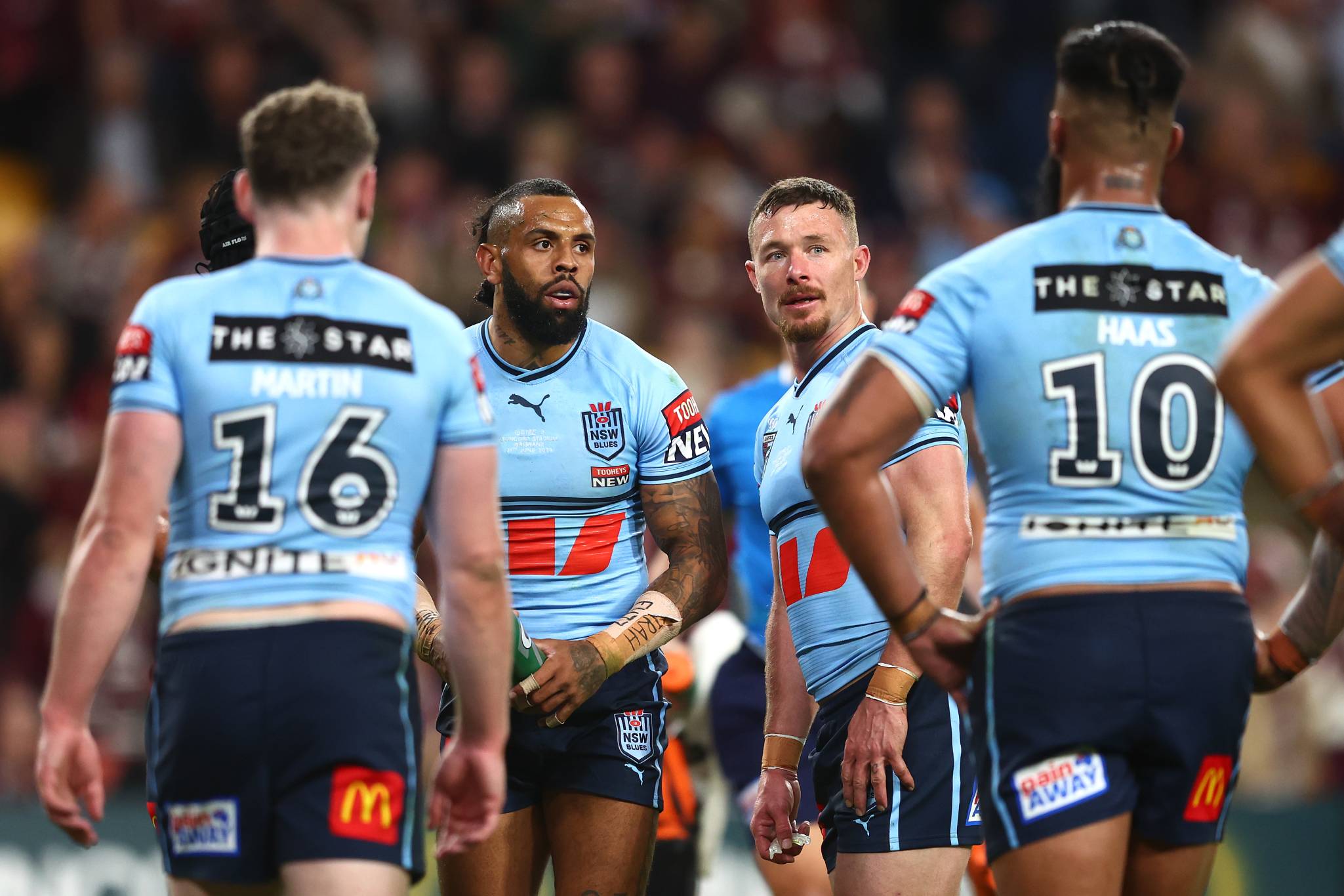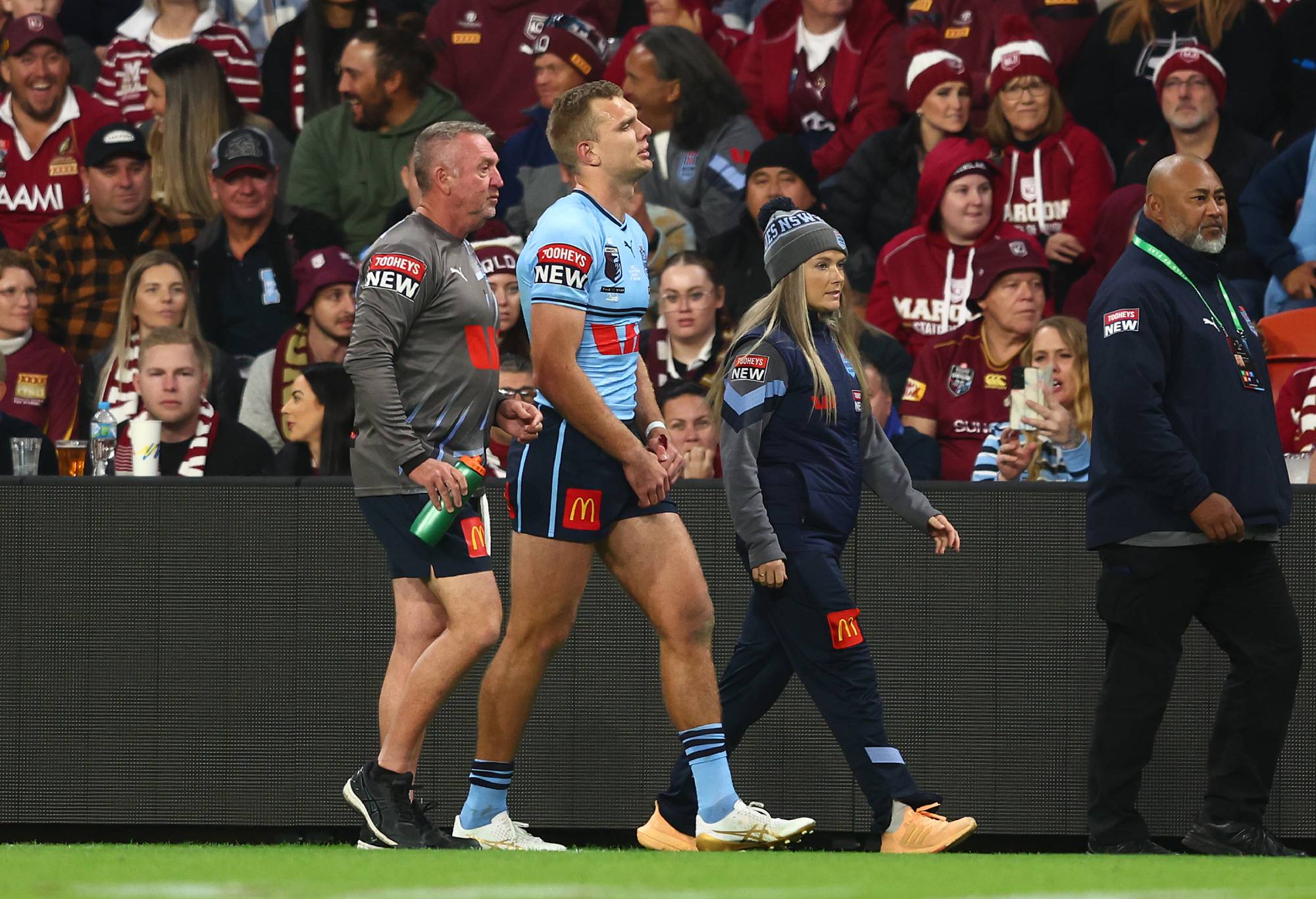We’ve all heard the phrase: you win or you learn. Some attribute it to Nelson Mandela, others to Conor McGregor. Nobody could say it about Brad Fittler.
The Blues coach, who will surely be that for Game 3 and no longer, will be remembered as one who repeated the same mistakes over and over, falling into traps set by Queensland counterpart Billy Slater time and again.
This has been the major theme of the last two years of State of Origin, in which his New South Wales side have won one game despite, on paper, having the far superior playing squad.
Beyond that, one could throw in the 2020 debacle, the worst Origin results since 1995, and an overall record that stands at eight wins, nine defeats having only once started as underdogs.
Bookies don’t tend to get these things wrong 16 times out of 17, but they have with Fittler’s Blues.
The narrative around Origin is dominated by discourse around fight, effort and heart, because that meets our expectations of what we would like this contest to be about.
Instead, it is about nuance and execution, an optimisation of the fabulous playing talent available to both coaches. It’s Origin, and everyone tries hard and everyone rips in: it’s the finesse that wins it.
Brad Fittler has consistently proven an ability to make his side worse than the sum of their parts rather than elevate them to more. Slater has had less time to work with his players, and yet they are more of a team.
On the field, the problems are myriad. There’s no clear strategy on how his side think that they will score points, other than trying to translate Penrith’s system into the rep arena.
The Panthers have had years of practice to hone their system, so they’re great at it, but the Blues have roughly ten field sessions, if everyone is fit, which they never are.
On top of that, the Panthers play in the NRL, where the other teams aren’t wall-to-wall superstars. Fundamentally, the Penrith system is about patience and the accumulation of pressure, and every team that tries to stop it fails because they have weak links.
In Origin, everyone is elite and there aren’t weak links.It ends up being patient to the point of inertia. In the last two games, NSW have had 74 tackles inside 20m for four tries, only one of which was created by their attacking shape.
The second flaw has been around the middle service, and the consistent inability of NSW to make it work.
Isaah Yeo, the fulcrum of it, gets space to play because Penrith win the linespeed battle, but in Origin – not to labour the point – everyone is good and fast and you just don’t get space to play like that.
Either you play middle service faster – like Souths do with Cameron Murray – or you don’t play it at all. The way the Blues did it was so telegraphed that Queensland could use Yeo as a pressing trigger for their outside backs: if he gets it, jam hard on the half.

Josh Addo-Carr of the Blues react after a Maroons try during game two of the State of Origin series between the Queensland Maroons and the New South Wales Blues at Suncorp Stadium on June 21, 2023 in Brisbane, Australia. (Photo by Chris Hyde/Getty Images)
That shouldn’t be possible for five consecutive games, but it has been. The only Blues victory, notably, came in Game 2 last year, when they kicked behind the jam within the first ten minutes. That move has never been seen since. You win or you learn, right?
The third is his constant inability to make substitutions. You’ll remember this from Game 1, where he kept his best middle trio on the bench until the 72nd minute and only used six of eight interchanges.
In Game 2, he got 14 whole minutes out of one of his three middles and left Cameron Murrray, arguably the best lock in the world, on until the 48th minute.
In the post-match press conference, he insisted that he wasn’t going to talk about interchanges, much as he had refused to do so in pre-game media.
Elite footy in the six again area is, in part, a game of fatigue management, and this is one of the key duties of the coach and their staff, particularly given the constant stream of data that comes to analysts from the devices in the backs of the jerseys.
Last year, Andrew Webster – now at head coach at the Warriors, then a Panthers assistant – once stood in for Ivan Cleary at a post-match presser when the head coach was recovering from surgery and insisted that Penrith knew their interchange plan ahead of time, and only adapted for injuries and HIAs.
It’s an element of the system that clearly has not been carried up to rep level, because there appears to be no plan at all, or at least, no plan that can’t be thrown out of the window at the first opportunity.
Fittler also revealed in the Game 2 press conference that he has spoken ahead of time to Damien Cook that he would use him as a centre, which brings us to the second point: the selections.

Tom Trbojevic of the Blues is assisted of the field after an injury during game two of the State of Origin series between the Queensland Maroons and the New South Wales Blues at Suncorp Stadium on June 21, 2023 in Brisbane, Australia. (Photo by Chris Hyde/Getty Images)
NSW have never picked a team that seemed to know how it was going to make its subs, or how it might adapt when things might go awry.
In Game 1, they picked no second hooker, but did pick a utility to cover halves and fullback. They lost a centre – a notoriously injury prone centre – and lost the game as their non-utility utility was forced to defend in a position he’d never defended in before.
In Game 2, they picked two hookers, but then played one in the centres – where he had never played before – as the aforementioned injury prone centre got injured again.
Fittler did this despite having Yeo – 24 games as an NRL centre – and Murray, who has also deputised there, available, as well as Hudson Young, who is plenty fast enough to do a job one man further out.
Matt Burton, a big bodied half who genuinely and former Dally M Centre of the Year, was left as 18th man in both occasions.
Having made the match-up of his edges a major factor, swapping them over from Game 1’s configuration, the coach then flipped them back instantly, abandoning his defensive idea at the first opportunity. His hooker rotation was also shot within three minutes.
Cook, like Nicho Hynes in the first game, was then left on a hiding to nothing as the Maroons ran everything at his edge. Indeed, the cameras caught Cam Munster screaming in a team huddle to tell Harry Grant in no uncertain terms where the attack was to be directed.
This season’s Origin has laid bare the fundamental problems of Fittler as a rep coach. In three of the last four years, his side have lost despite overwhelming advantages. Only 2021, the ultimate asterisk season in so many regards, stands in his favour.
Once the rules reverted, Fittler’s ideas fell apart. Increasingly, it looks like that team won in spite of him, rather than because of him. NSW must now go back to the drawing board and find a coach to help them bounce back in 2024.






























































































